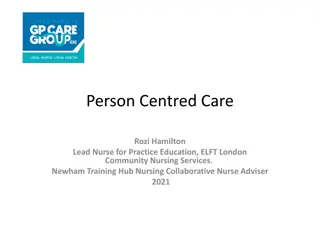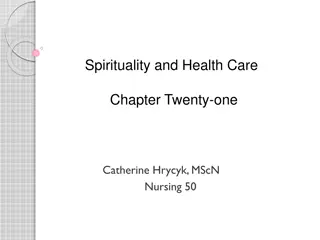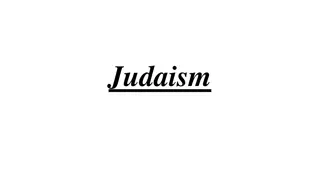Understanding Jewish Spiritual Care: Beliefs and Practices
Judaism's spiritual care is rooted in core beliefs such as the existence of God, the Torah, and key tenets of faith. Important aspects include the Jewish calendar, the role of the rabbi in religious guidance and pastoral counseling, and diverse views on the afterlife. Providing spiritual care to Jewish patients involves sensitivity to cultural practices and beliefs. Outreach efforts in Judaism are different from those in Christianity, requiring respect and understanding when ministering to Jewish individuals.
Download Presentation

Please find below an Image/Link to download the presentation.
The content on the website is provided AS IS for your information and personal use only. It may not be sold, licensed, or shared on other websites without obtaining consent from the author. Download presentation by click this link. If you encounter any issues during the download, it is possible that the publisher has removed the file from their server.
E N D
Presentation Transcript
Judaism Spiritual Care Partners
Core Tenants God exists always, created the world, and leads it. God is One and wrote the Torah (the Law). The Torah was given to the people at Sinai. Moses as the main prophet of the prophets Messiah to bring peace; resurrection of dead 13 tenants of faith (derived from the Torah) as outlined by Maimonides serve as foundation for Jewish belief system. Oral tradition plays an essential role along with written tradition.
The Jewish Calendar Major events Three festivals: Sukkot, Pesach, and Shavuot High Holidays: Rosh Hashana and Yom Kippur Rabbinic Fasts: Esther, Gedalia, Tevet, AV Hanukkah and Purim (Calendared Happy Days without long services or restrictions such as electricity, cars, cooking, etc.) *It can be particularly hard for people to be inside a hospital during these times, as they wish to be with their families and loved ones on these days.
Role of the Rabbi Religious direction, pastoral counseling Religious direction includes customs and laws regarding burial and mourning practices. Pastoral counseling includes encouragement regarding emotional expression: Sadness is understood and its expression encouraged. Contentment: Not a lack of faith to be ready for death; it s really part of protocol to get ready.
The Jewish Concept of the Afterlife Various denominations will have various beliefs related to the afterlife and what it s like there. Some may stress resurrecting; others stress reunion with loved ones or friends. Olam HaEmes referred to on occasion as the world of truth. But attention to the here-and-now is primary. There s no concept or value in dying to be with God because He is with us in life even more so.
Spiritual Care Judaism does not have missionaries except for outreach efforts to their own, so the knowledge that Christians do can cause wariness. Ask permission to continue with your visit with these ideas in mind for reassurance purposes. Know that most times, these are non-issues.
Spiritual Care Basics for Ministering to Jewish Patients: - If a Jewish patient needs spiritual support, first ask if he/she prefers to speak with a rabbi. - Prayer: Certain prayers that are more closely associated with Christianity would not be appropriate. For example: The Lord s Prayer is not appropriate. Psalm 23 is well-known and would be appropriate to use. - Be sensitive to the fact that some patients might not be open to visits from Christian spiritual caregivers, as they may fear being proselytized to. Most of the time, this is not an issue. - Always ask permission to visit (this goes for all patients).
Spiritual Care: Prayer Before prayer, general pastoral counseling should be held so as not to make them uncomfortable with jumping into religiosity. Prayer might not be wanted by the patient because it was done recently by other acquaintances or for other varying reasons.
Jewish Prayers I The Mishabeirach Mostly associated with services, but can be done at any time and includes person s Hebrew name (if have one) It would be highly unusual for a non-Jewish person or clergy to recite this on a Jew s behalf. Note that classically a prayer for the sick would include a request for healing for other members of the general, broader Jewish community.
Jewish Prayers II Tehillim / Psalms Go-to passages for the sick and most recommended if reciting scripture during spiritual care visit. Psalms 121, 130, 91 are most popular.
Jewish Prayers III The Shema Most ancient and most historical prayer Only biblical and biblically required daily prayer Most known for its recitation prior to death Often read along with the family s congregational rabbi Acc. to Talmud, extensive praise is due to those who utter it during times of grave danger; seen as ultimate affirmation of faith.
Contact Information Information in this presentation provided by Rabbi Dovid Asher, employee with Bon Secours Mercy in Richmond, Va. Rabbi Dovid Asher, Religious Provider Bon Secours Mercy Richmond Keneseth Beth Israel (804) 402 6363 RabbiAsher@kbirichmond.com David_Asher@bshsi.org























